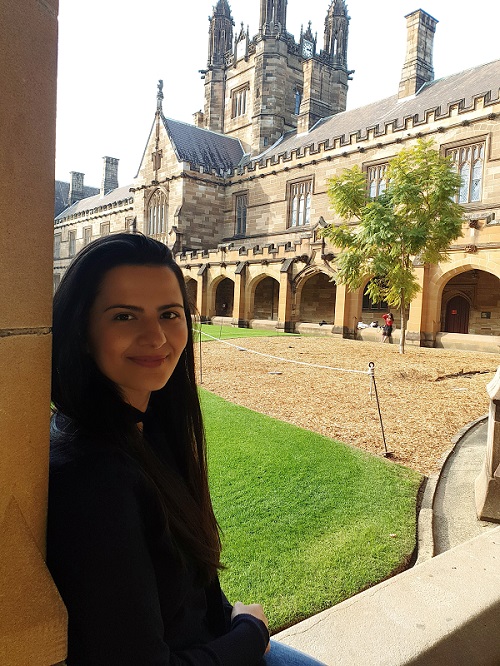Turner Freeman is proud to announce that it will, over two years, fund the vital research work of Tamkin Ahmadzada.
Tamkin Ahmadzada was born in Kabul, Afghanistan, in the middle of that country’s civil war. She was a small baby, barely a year old, when her family fled Afghanistan in order to seek asylum. They left behind their home and all of their treasured possessions. The family fled to Pakistan where they settled in a shared house with others feeling blessed by the fact that they had escaped the war.
In the circumstances in which they were living it was impossible for the family to build a future.
Her parents’ ambition was to move the family to a country that offered education and opportunity to their children.
They lived in Pakistan for a number of years until they were fortunate to be granted a humanitarian visa to settle in Australia. Tamkin was 10 when she arrived. In Australia they were able to start a new life, settling in Sydney.
It is now 20 years since Tamkin first arrived in Australia. She gained an education through our public schools that enabled her to pursue her ambitions in life.
To gain an insight into Tamkin’s work it is perhaps best to allow Tamkin to describe that work herself. She has this to say:
“I’ve always had a passion for studying medicine. However, in my first practical biology lesson I made the important self-discovery that I cannot stand the sight of blood or real-life organs. I was nevertheless passionate about studying the human body (only through colourful textbook animations) and I loved learning about the different ways to treat disease and medical conditions.
After completing high school I decided to pursue an undergraduate degree in Biomedical Engineering at The University of Sydney, where I was able to learn about medical devices and to have the opportunity to make an impact, without being directly involved with patients.
Shortly after completing my undergraduate degree I was lucky to be offered a position in a medical device regulatory firm, where I worked as a regulatory consultant. In this role, I was responsible for managing regulatory submissions and preparing technical file documentation, which included conducting clinical evaluations, scientific research and biocompatibility assessments for a range of medical devices and in vitro diagnostics. Although I really enjoyed my role, after almost 5 years in the regulatory field, I felt the urge to expand my research skills and learn more about the science behind medical treatments. I therefore decided to leave the industry to pursue a PhD in medical research.
I am now a third year PhD student at The University of Sydney. The focus of my research is to discover novel biomarkers in malignant pleural mesothelioma (MPM), which is a rare but fatal cancer of the pleura surrounding the lungs.
The main challenge with MPM is that it is often diagnosed at an advanced stage, which often leads to a poor prognosis, limited treatment options and low survival rates.
My research involves analysis of tumour biomarkers as well as analysis of extracellular vesicles as potential blood-based biomarkers that could help with early diagnosis, improve prognostication and help to develop targeted therapies for patients.
I am grateful to have had a wide support network, including from my supervisors, Prof Stephen Clarke, Dr Steven Kao, Dr Elham Hosseini-Beheshti, Prof Georges Grau and Dr Glen Reid, as well as all my laboratory colleagues, especially Annette Juillard and Pierre Juillard, my lovely family and friends, and now my sponsors who make this research possible.
I am passionate about medical research and I hope that my research can lead to improved outcomes for MPM patients.
Some of my research has already been published. The publications include:
- Ahmadzada, T., Cooper, W.A., Holmes.,… Kao,S. (2020). JTO Clinical and Research Reports, 1(4), 100075. https://doi/10.1p/16/j.tjocrr.2020.100075
- Ahmadazada, T., Kao, S., Reid, G., Clarke, S., Grau, Ge. E., & Hosseini-Beheshti, E. (2020). Critical reviews in Oncology/Hematology, 150, 102949. https://doi.org/10/1016/Jcritrevonc.2020.102949
- Ahmadzada, T., Lee, K., Clark, C., Cooper, W.A., Linton, A., McCaughan, B, … Kao, S. (2019). Lung cancer, 130, 35-41. https://doi.org/10.1016/j.lungcan.2019.02.005
- Ahmadzada T., Reid G., Kao S. Journal of Thoracic Diseases. 2018 April; 10(Suppl 9): S1003-S1007. https://doi.org/10.21037/jtd.2018.04.31
- Ahmadzada T.,, Kao S., Reid G., Boyer M., Mahar A., Cooper W. Journal of Clinical Medicine. 2018 Jun 15;7(6). pii. E153. https://doi.org/10.2290/jcm7060153
- Ahmadzada T., Reid G., McKenzie D., Biophysical Reviews. 2018 feb;10(1):69-86. doi: 10.1007/s12551-017-0392-1. Full-test access: https://rdcu.be.EwnV
- Ahmadzada T., McKenzie D., James N., Yin Y., Li Q. Thin Solid Films, 591 (2015), 131-136. https://doi.org/10.1016/J.tsf.2015.0838
In relation to the Turner Freeman Sponsorship all that I can say is thank you so much for supporting my work!”
Our sponsorship of Tamkin’s work continues our long history of involvement with and support of research in relation to mesothelioma. We are delighted to be able to assist Tamkin to continue this vital research.

Photo: Tamkin Ahmadzada